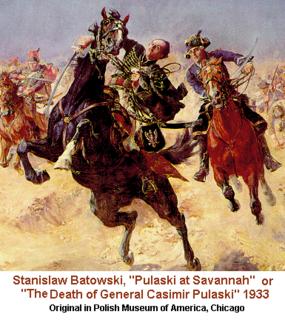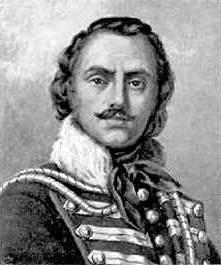Patriot Gets Hero's Funeral Two Centuries Later- Though Mystery Lingers
 Savannah, Ga (United States):
Savannah, Ga (United States):
The Polish nobleman regarded as the father of the American cavalry  finally received a hero's funeral on the 226th anniversary of the Revolutionary War battle in which he was mortally wounded.
finally received a hero's funeral on the 226th anniversary of the Revolutionary War battle in which he was mortally wounded.
However, the mystery continues over whether the remains buried Sunday are those of Brig. Gen. Casimir Pulaski, a hero in Poland and among Polish-Americans for his sacrifice.
"Certainly from a historical standing it was overdue," said Francis X. Hayes, the Savannah businessman who organized the burial. "His remains were just unceremoniously sealed up in the monument. This gave him the kind of ceremony he would have received had he been in Poland."
Chatham County Coroner James C. Metts Jr. had exhumed the remains in 1996 when the monument was dismantled for repairs. After eight years of trying, investigators failed to extract a complete DNA sequence to compare with a living Pulaski descendant found in Poland.
A draft report by Metts' team, made public in June, concluded "the mystery remains unsolved." It also said "strong circumstantial evidence does suggest that the remains are Casimir Pulaski."
The unsolved mystery, though, did not halt the funeral. More than 700 people filled the Cathedral of St. John the Baptist for a memorial Mass.
A regiment of Polish cavalrymen on horseback escorted the casket in a procession through the streets, followed by a riderless horse with empty boots in the stirrups.
Polish Bishop Tadeusz Pwoski read funeral rites beneath the marble obelisk built to Pulaski in 1854, sprinkling the flag-draped casket with holy water and dirt from the gravesite.
Janusz Reiter, Poland's ambassador to the United States, said it doesn't matter that the remains were never proven to be Pulaski's.
Pulaski came to America in 1777, exiled from Poland after helping lead an uprising against Russian incursion. Recommended by George Washington, he took command of the colonial cavalry.
After his legion of 600 troops helped fight off the British at Charleston, S.C., Pulaski headed to Savannah for the ill-fated battle to reclaim the captured city. He fell mortally wounded by grapeshot from a British cannon on Oct. 9, 1779.
Oct 10, 2005
Russ Bynum, Associated Press San Jose Mercury News, United States
 Savannah, Ga (United States):
Savannah, Ga (United States):The Polish nobleman regarded as the father of the American cavalry
 finally received a hero's funeral on the 226th anniversary of the Revolutionary War battle in which he was mortally wounded.
finally received a hero's funeral on the 226th anniversary of the Revolutionary War battle in which he was mortally wounded.However, the mystery continues over whether the remains buried Sunday are those of Brig. Gen. Casimir Pulaski, a hero in Poland and among Polish-Americans for his sacrifice.
"Certainly from a historical standing it was overdue," said Francis X. Hayes, the Savannah businessman who organized the burial. "His remains were just unceremoniously sealed up in the monument. This gave him the kind of ceremony he would have received had he been in Poland."
Chatham County Coroner James C. Metts Jr. had exhumed the remains in 1996 when the monument was dismantled for repairs. After eight years of trying, investigators failed to extract a complete DNA sequence to compare with a living Pulaski descendant found in Poland.
A draft report by Metts' team, made public in June, concluded "the mystery remains unsolved." It also said "strong circumstantial evidence does suggest that the remains are Casimir Pulaski."
The unsolved mystery, though, did not halt the funeral. More than 700 people filled the Cathedral of St. John the Baptist for a memorial Mass.
A regiment of Polish cavalrymen on horseback escorted the casket in a procession through the streets, followed by a riderless horse with empty boots in the stirrups.
Polish Bishop Tadeusz Pwoski read funeral rites beneath the marble obelisk built to Pulaski in 1854, sprinkling the flag-draped casket with holy water and dirt from the gravesite.
Janusz Reiter, Poland's ambassador to the United States, said it doesn't matter that the remains were never proven to be Pulaski's.
Pulaski came to America in 1777, exiled from Poland after helping lead an uprising against Russian incursion. Recommended by George Washington, he took command of the colonial cavalry.
After his legion of 600 troops helped fight off the British at Charleston, S.C., Pulaski headed to Savannah for the ill-fated battle to reclaim the captured city. He fell mortally wounded by grapeshot from a British cannon on Oct. 9, 1779.
Oct 10, 2005
Russ Bynum, Associated Press San Jose Mercury News, United States









